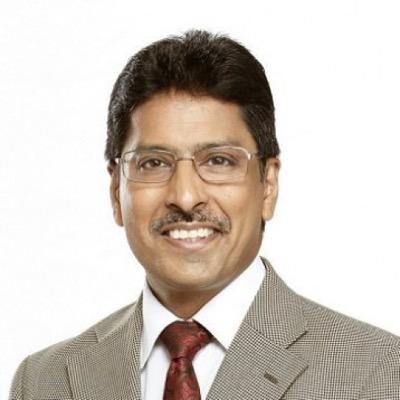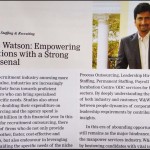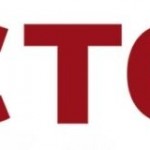A Human Resources leader with diverse industry experience, from civil service to engineering, Information Technology, pharmaceuticals, automotive and a conglomeration of Hydrocarbons, retail, media and telecom/ digital services, he has been the CHRO of two New York Stock Exchange listed companies out of India and of two Fortune 500 companies. He has helped all the companies where he was the CHRO to make it to the List of Best Companies to Work For in India. He has had significant global exposure to all facets of HR and organizational effectiveness, especially large scale transformation.
His personal goal is to support each person he touches on his/ her journey to become a better professional and more importantly, a more complete person. Hence, he spends his time on coaching, mentoring, career advice and even being a simple Agony Aunt! It is important to him because it touches lives of people so deeply.
Specialties: Strategic HR, Change Management, Leadership, Organizational Transformation, Talent Management, Coaching, Training
You could follow his tweets @prabirjha on Twitter
Here are some thoughts of Mr. Prabir Jha, who spoke to Wenger & Watson on various aspects of his career and learnings gained from them. Also, he has offered a few tips for the New age Recruiters! Read on.
Ø: The 1st Job always holds a special place for an individual, where did you start your career?
A: I started my career as a fresh civil services probationer of the 1990 batch. After my initial training I was posted to a defense establishment and started looking after all HR & IR issues apart from township and civic administration.
Ø: Could you share your learnings of your 1st job?
A: Connect, Create and Communicate. I never really worked ever at the bottom of the pyramid. Even As a young civil servant, I was a leader of a big team and responsible for a huge number of people and their families. I learnt that you need to connect with various stakeholders and understand multiple perspectives before taking an eventual decision. There is no one clear perspective. I learnt that you also need to think differently to envision and create new possibilities. To challenge existing paradigms and create a new future needs bold thinking and huge communication. But it always works. Finally, I learnt you cannot do everything alone and by yourself. To build a good team, to trust and to delegate well but take full accountability for all the misses is what leadership is all about.
Ø: As an individual gains experience, they are given people management responsibility. Can you recollect who was your 1streportee & the experience of handling your 1st team?
A: As I mentioned, I never ever worked as an individual contributor. I had multiple reports in my first job, many of them decades older than me. To respect their experience and yet to push and challenge them was the big challenge. God has been kind. I had no trouble in managing my relationships with them nor being their manager even as a young rookie, fresh out of the civil service academy. It is about respect and space while holding people accountable.
Ø: What are your suggestions for effectively managing teams?
A: First, the team must have the best possible talent. Keep raising the talent baseline always. Build plurality in thinking and diversity in composition. Allow people to sell their ideas. Challenge them to think different. Kill bad political behaviour. Trust building, not blind obedience, is key. Appreciate and recognize real time. Give feedback and coach to get the best out of each one. Finally, leverage each team member for the unique strengths each brings to the team.
Ø: HR is moving from People to Culture Management, how do you go about doing it so well?
A: Culture seems soft and fuzzy but is a strategic imperative for sustainable success, a clear differentiator that one cannot buy off the shelf. HR is also moving from process to experience. The collectivity of experiences becomes culture. Articulating and sharply defining ‘aspired culture’ is the start point. You then make sure all HR sub-systems get aligned to reinforce that aspired culture. As part of that effort, many will automatically de-select themselves and the culture will attract the appropriate kind of people. It is a slow process but done honestly, can transform corporations.
Ø: In all these years of service, can you share with us, one of the toughest situations you have had to face at your workplace?
A: In my career, I have done significant work transforming work places. The challenge is to be true to your belief and principle even as you have your share of critics and detractors. People will always see things from their unique individual perspective, and self-preservation and self- aggrandizement are very natural human tendencies. Many of them have sponsors and support in very well placed power centers. To push through an agenda through all these minefields selflessly tests you almost every day.
Ø: On the Job training is an important tool in today’s world, Can you please give us some inputs on how to utilize OTJ effectively?
A: It is about experiences that any job offers that helps build people. Coaching and mentoring on the job is an important part of development, far beyond what classroom inputs can offer. It also gets one to understand that textbook solutions do not work in a vacuum. Soft skills become a key ingredient of successful delivery. The need for and the ability to collaborate, influence and communicate is something you discover on on the job training experiences.
Ø: What has been your biggest accomplishment so far?
A: To have been able to build high performing teams that delivered the most complex HR transformations across organizations.
Ø: Finally, Your views on the traits that a new age recruiter should have?
A: The ability to look beyond the obvious candidates and catchments. The willingness to stay connected with clients and candidates beyond when you need them. The empathy to pick up the cues on either side. And finally the ability to influence, not sell.








3 comments
Excellent interview…!
Shree Prabir Jha is my virtual mentor and I am always curious to learn from & know about him more & more..
He redefined HR in Asian region. If anybody wants to study about retention , motivation , training & powerful tools for extra miles just follow him on the social media and go through his posts.
Prabir Jha is a great ocean.
Action requires knowledge, and now I can act!